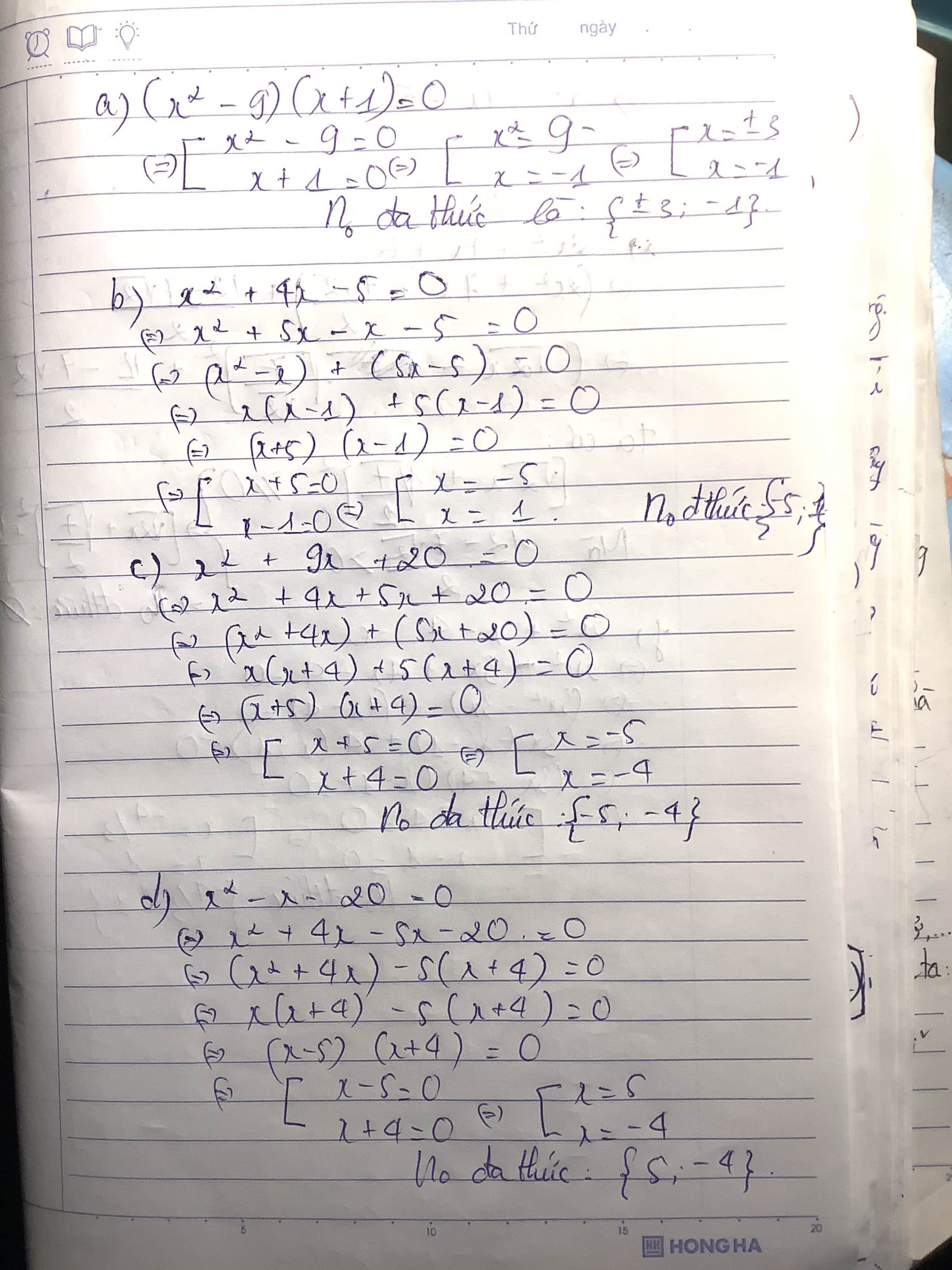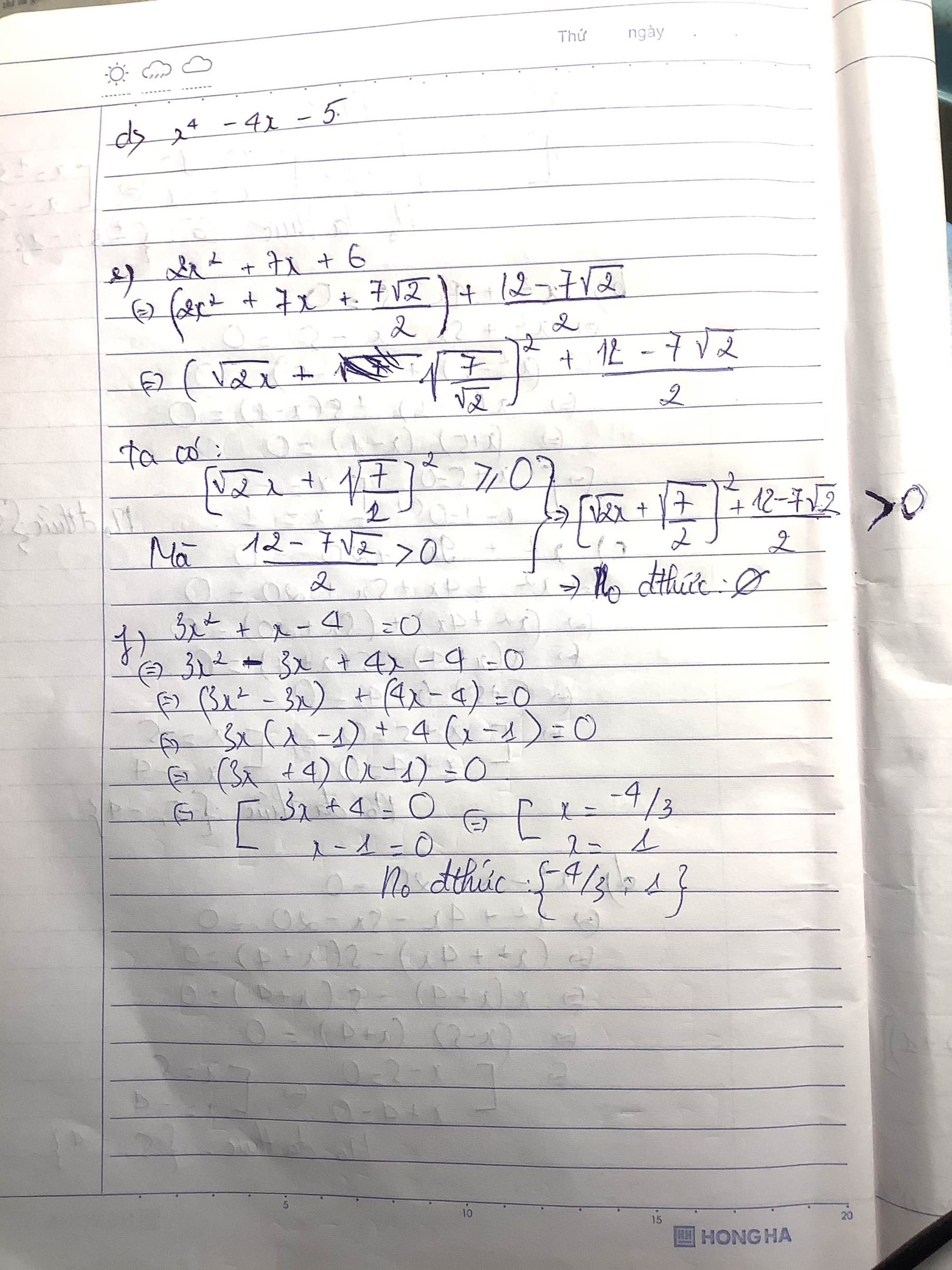
Hãy nhập câu hỏi của bạn vào đây, nếu là tài khoản VIP, bạn sẽ được ưu tiên trả lời.


1: P(x)=M(x)+N(x)
=-2x^3+x^2+4x-3+2x^3+x^2-4x-5
=2x^2-8
2: P(x)=0
=>x^2-4=0
=>x=2 hoặc x=-2
3: Q(x)=M(x)-N(x)
=-2x^3+x^2+4x-3-2x^3-x^2+4x+5
=-4x^3+8x+2

Cho A(x) = 0, có:
x2 - 4x = 0
=> x (x - 4) = 0
=> x = 0 hay x - 4 = 0
=> x = 0 hay x = 4
Vậy: x = 0; x = 4 là nghiệm của đa thức A(x)

Bài 2 :
a, \(x^2-4x+4+1=\left(x-2\right)^2+1\ge1\)
Dấu ''='' xảy ra khi x = 2
b, Ta có \(\left(x+1\right)^2+10\ge10\Rightarrow\dfrac{-100}{\left(x+1\right)^2+10}\ge-\dfrac{100}{10}=-10\)
Dấu ''='' xảy ra khi x = -1
Bài 1 :
a, Ta có \(A\left(x\right)=x^2-4x+4=0\Leftrightarrow\left(x-2\right)^2=0\Leftrightarrow x=2\)
b, \(B\left(x\right)=x^2\left(2x+1\right)+\left(2x+1\right)=\left(x^2+1>0\right)\left(2x+1\right)=0\Leftrightarrow x=-\dfrac{1}{2}\)
c, \(C\left(x\right)=\left|2x-3\right|=\dfrac{1}{3}\Leftrightarrow\left[{}\begin{matrix}2x=\dfrac{1}{3}+3=\dfrac{10}{3}\\2x=-\dfrac{1}{3}+3=\dfrac{8}{3}\end{matrix}\right.\Leftrightarrow\left[{}\begin{matrix}x=\dfrac{5}{3}\\x=\dfrac{4}{3}\end{matrix}\right.\)

a, Cho \(x^2+2022x=0\Leftrightarrow x\left(x+2022\right)=0\Leftrightarrow x=0;x=-2022\)
b, \(3x^2+7x+4=0\Leftrightarrow\left(x+1\right)\left(3x+4\right)=0\Leftrightarrow x=-1;x=-\dfrac{4}{3}\)
c, \(2\left(x^2+2x+1-1\right)+5=0\Leftrightarrow2\left(x+1\right)^2+3=0\)(vô lí)
Vậy đa thức ko có nghiệm tm

a/ \(M\left(x\right)=-x^2+5\)
Có \(-x^2\le0\forall x\)
=> \(M\left(x\right)\le5\forall x\)
=> M(x) không có nghiệm.
2/
Thay \(x=\dfrac{1}{2}\) vào đa thức M(x) có
\(M\left(\dfrac{1}{2}\right)=\dfrac{1}{4}a+\dfrac{5}{2}-3=0\)
\(\Leftrightarrow\dfrac{1}{4}a=\dfrac{1}{2}\)
\(\Leftrightarrow a=2\)
Vậy...

Bài 2:
a: Sửa đề: \(x^2+2x+3\)
Đặt \(x^2+2x+3=0\)
\(\Delta=2^2-4\cdot1\cdot3=4-12=-8< 0\)
Do đó: Phương trình vô nghiệm
b: Đặt \(x^2+4x+6=0\)
\(\Leftrightarrow x^2+4x+4+2=0\)
\(\Leftrightarrow\left(x+2\right)^2+2=0\)(vô lý)


a) (4x-3)(5+x)=0
=>4x-3=0 hoặc 5+x=0
=>x=3/4 hoặc x=-5
b)x2 -2=0
=>x2=2
=>x=±\(\sqrt{2}\)